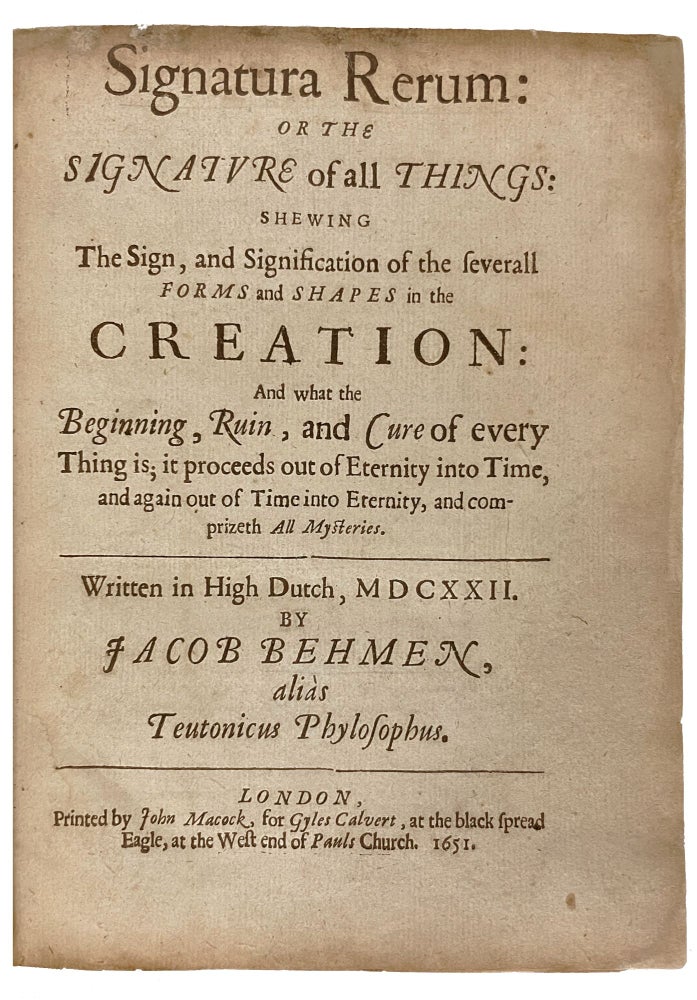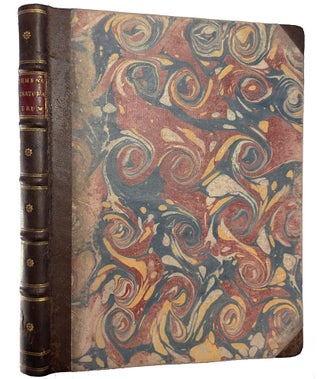BÖHME, Jacob (1575-1624) [BOEHME, BEHMEN]
Signatura rerum. Or the Signature of all Things, shewing The sign and signification of the several forms and shapes in the Creation and what the beginning, ruin and cure of every thing is; it proceeds out of eternity into time and comprizeth all mysteries. Written in High Dutch 1622 by Jacob Behmen, alias Teutonicus Phylosophus.
London: John Macock for Gayles Calvert, 1651. 4to. (7 1/8 x 5 3/8 inches). [8], 224 pp.
Bound in half calf, marble paper boards, spine with raised bands in six compartments with ruled lines and center tool, red lettering piece in second compartment.
Rare first English edition of Jacob Böhme's a groundbreaking work of Christian mysticism translated by J. Ellistone, which reveals the hidden connections between the material and spiritual worlds through its exploration of the signatures imprinted on all of creation.
At once leatherworker, mystic, and founder of modern theosophy, Böhme published little in his lifetime, and what was published brought him endless trouble with the Church. Despite this, Böhme had a profound influence on later philosophical movements such as German Idealism and German Romanticism with Hegel describing him as "the first German philosopher". Böhme was born in Alt Seidenberg (now in present-day Poland) to a Lutheran. Deemed too weak for husbandry, Böhme was sent to Seidenberg as an apprentice to become a shoemaker. While he lived with a family who was not Christian, Böhme regularly prayed and read the Bible and consumed the works of visionaries such as Paracelsus, Weigel and Schwenckfeld. After leving his apprenticeship, Böhme travelled as far as Görlitz before returning as a master craftman to set up his own workshop and started a family. Böhme later joined the "Conventicle of God's Real Servants" - a parochial study group organized by poet and mystic Martin Moller. Since his youth, Böhme often had spiritual experiences including one that occurred while he was travelling for business where, as he later recalled, was "surrounded with a divine light, and stood in the highest contemplation and kingdom of joys." This title, The Signature of All Things, written in High Dutch in 1622 following a series of Böhme's mystic experiences appears here in the first English edition. In it, Böhme explains systematically the cosmology that lies at the heart of his whole mystical approach and experience, revealing his mystical pantheism and his dialectical conception of God, in which good and evil are rooted in one and the same being. The book is a highly symbolic work that deals with the nature of God, creation, and the relationship between the spiritual and physical worlds. In brief, Böhme's thesis can be summarised thus: everything in the material world bears the imprint or "signature" of its spiritual counterpart, and that by understanding these signatures, one can gain insight into the divine. The present work is the title for which Böhme is most famous, and it is invoked by James Joyce in the Proteus episode in Ulysses ("Ineluctable modality of the visible.") Boehme's ideas had a significant influence on later mystics, philosophers, and theologians, including Goethe, Nietzsche, and Jung. Signatura Rerum remains a classic work of Christian mysticism and esoteric philosophy, and is still studied and debated by scholars and practitioners today.
Wing B3419; Bach, "Jacob Boehme" in Protestants and Mysticism in Reformation Europe; Hartman, The Life and the Doctrines of Jacob Boehme, the God-Taught Philosopher.
Item #40032
Price: $3,250.00



